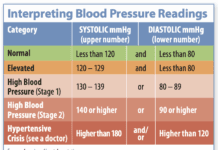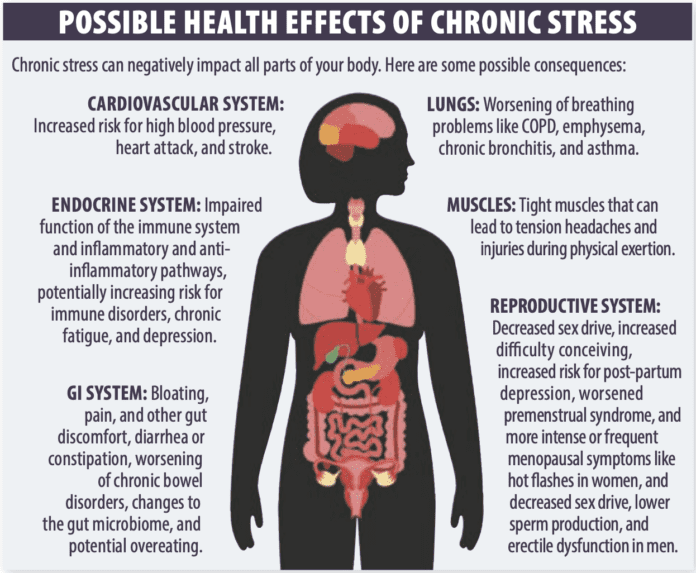Someone jumps out in front of you, you realize you’re running out of time to complete an important task, or your boss calls you into her office. Your body releases hormones that speed up your breathing and heart rate, raise your blood pressure, and release glucose from your liver for energy—getting you ready to fight or flee. This rapid response evolved to help us deal with immediate threats in our environment. It is not designed to handle long-term, ongoing stressors.
Acute vs. Chronic. Under acute stress, you may feel a jolt of energy and notice your visual focus and thinking sharpen and your motivation increase. You are faster and stronger, and even your immune system is primed for action. When this moment of acute stress passes, your vital signs (and everything else) return to normal.
Chronic stress is different. If you’re under continuous stress for long stretches of time, such as from a high stress job, financial insecurity, living in fear of violence, or caring for a chronically ill loved one without adequate support, your body never gets the chance to return to baseline.
Health Impacts. Long-term exposure to stress affects your whole body. It may increase your risk for health problems including high blood pressure, heart attack, stroke, type 2 diabetes, and mental health issues like depression, anxiety, and addiction. See “Possible Health Effects of Chronic Stress” for more information.
Day-to-day symptoms of chronic stress, such as trouble concentrating, crankiness, changes in appetite, fatigue, insomnia, and turning to mind-altering substances for relief, can interfere with productivity and relationships and add to the negative health impacts of chronic stress.
Managing Stress. If you are feeling stressed a lot of the time, it’s important to identify the source and find healthy ways to reduce or relieve that stress (and avoid unhealthy ways, such as overeating, smoking, illicit drug use, or excessive alcohol consumption). If you can directly address the source of your stress (by discussing job responsibilities with management, for example), do so. If this is not possible, take steps to manage the stress in your life with the tips in the “Take Charge!” box. Your whole body will thank you!
➧ Get Moving. Regular physical activity can take your mind off your stress, provides a physical outlet for frustration and anger, may help you sleep, and can cause the release of mood-boosting hormones in your brain.
➧ Eat Healthy Foods. While this does not directly reduce stress, it may help fight the negative health effects stress is having on your body.
➧ Get Enough Sleep. Aim for seven to nine hours of quality sleep a night.
➧ Stay Positive. Actively focus on the good things in your life. Setting aside a few minutes a day to remind yourself of the positive things or keeping a gratitude journal can help.
➧ Relax. Schedule a soak in the tub or a nature walk, and try practicing relaxation techniques like deep breathing, meditation, yoga, or tai chi.
➧ Have Fun. Making time for hobbies and activities you enjoy can keep you from dwelling on the negative.
➧ Stay Social. Having people in your life to talk to (and have fun with) can provide relief.
➧ Let Go. Accept that there are some things you cannot control.
➧ Plan. Making a plan, learning time management techniques, and setting realistic goals may help if you are feeling overwhelmed.
➧ Say “No.” If there is too much going on in your life, it’s okay to say “no” to new requests.
➧ Seek Help. Turn to support groups, family and friends, helplines, community groups, foundations, governmental agencies, and other sources for some relief. If you are thinking of hurting yourself or are in immediate distress, call or text 988 to reach the Suicide & Crisis Lifeline.























